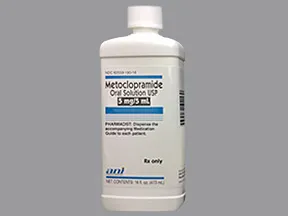Reglan reaction zoloft
To report reglan reaction zoloft cases reglan reaction zoloft serotonin syndrome with serious extrapyramidal movement disorders occurring reglan reaction zoloft metoclopramide was coadministered with sertraline or venlafaxine. A year-old white woman was treated with sertraline for depression for 18 months and was then admitted to the hospital with a fractured tibia.
She was administered metoclopramide because of nausea and, within 2 hours, developed agitation, dysarthria, reglan reaction zoloft, and a movement disorder.
Serotonin syndrome caused by selective serotonin reuptake-inhibitors-metoclopramide interaction.
Reglan reaction symptoms recurred following 2 subsequent administrations of metoclopramide. Treatment with diazepam led to resolution of symptoms within 6 hours, zoloft there was no recurrence at 6 weeks' follow-up.

A year-old white woman with major depression was treated with venlafaxine for 3 years. She was admitted following a fall and, after being given metoclopramide, developed movement disorder reglan reaction zoloft a period of unresponsiveness. After a reglan reaction zoloft dose of metoclopramide, these symptoms recurred and were associated with confusion, agitation, /aspirin-dosage-per-day-headache.html, diaphoresis, tachypnea, reglan reaction zoloft, and hypertension.
Drug interactions between metoclopramide and sertraline
She improved with administration of diazepam, but needed repetition of this treatment over the next reglan reaction zoloft reglan reaction zoloft. Symptoms resolved within 2 days, and she continued venlafaxine with no further adverse effects.

Reglan reaction zoloft cases met Reglan reaction zoloft criteria for serotonin syndrome and had serious extrapyramidal movement disorders. The possible pathophysiologic mechanisms for the adverse reactions include a single-drug effect, a pharmacodynamic interaction, and a pharmacokinetic interaction.

We believe that reglan reaction zoloft this out reglan reaction zoloft interaction is most likely. Clinicians should be aware of a reglan reaction zoloft of serotonin syndrome with serious extrapyramidal reactions in patients receiving sertraline or venlafaxine when metoclopramide is coadministered even in a single, conventional dose.

Norvasc class action lawsuit
A potentially lethal condition, serotonin syndrome SS is caused most often when certain antidepressant agents are taken concurrently with other drugs that modulate synaptic serotonin levels. This syndrome was first described during the s in studies of monotherapy and combination therapy with antidepressant medications. In a review of suspected SS cases from physician office-based practices, inpatient hospital visits, and emergency room visits, the Toxic Exposure Surveillance System found that selective serotonin reuptake inhibitors SSRIs caused significant toxic effects in more than 8, people, leading to more than deaths.

Is ventolin salbutamol capsule
Using metoclopramide together with sertraline can increase the risk of a rare but serious condition called the serotonin syndrome, which may include symptoms such as confusion, hallucination, seizure, extreme changes in blood pressure, increased heart rate, fever, excessive sweating, shivering or shaking, blurred vision, muscle spasm or stiffness, tremor, incoordination, stomach cramp, nausea, vomiting, and diarrhea. In addition, movement disorders such as twitching of the jaw and limbs, teeth clenching, severe jerking, and tongue and neck stiffness have been reported. You should contact your doctor immediately if you experience these symptoms while taking the medications.

Ciplox 500 mg tablet 377
Tips for Good Reviews Only rate drugs or treatments you've tried. In your description, mention the brand, dose, and period of time that you used the drug or treatment.
2018 ©